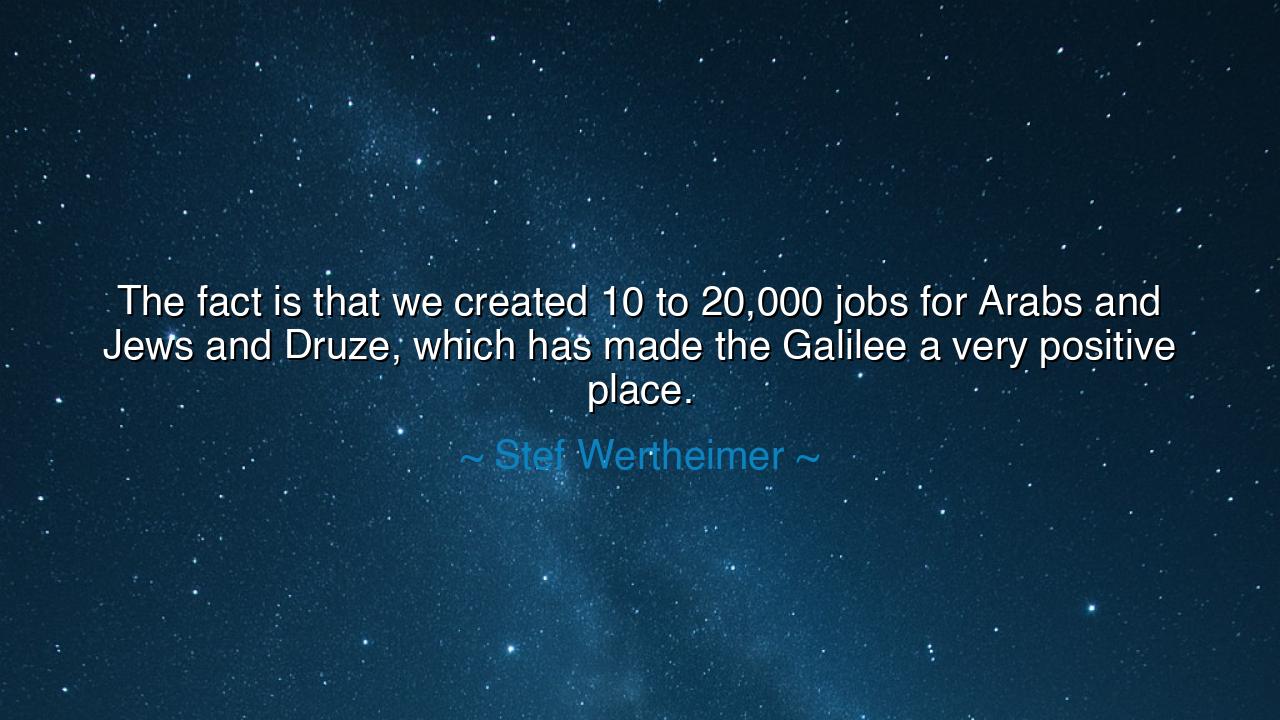
The fact is that we created 10 to 20,000 jobs for Arabs and Jews
The fact is that we created 10 to 20,000 jobs for Arabs and Jews and Druze, which has made the Galilee a very positive place.






The words of Stef Wertheimer, “The fact is that we created 10 to 20,000 jobs for Arabs and Jews and Druze, which has made the Galilee a very positive place,” shine as a testament to the power of labor not only to feed bodies, but to heal divisions. In his statement lies a truth as old as humanity: that when people are given purpose, when they work side by side, the walls of separation weaken, and the seeds of peace take root. For in the sweat of creation, enemies can become neighbors, and strangers can become allies.
The origin of this wisdom lies in Wertheimer’s vision as an industrialist and philanthropist in Israel. He saw the land of the Galilee, a region marked by beauty but also tension, and sought not only to build factories but to build bridges. By offering jobs to Jews, Arabs, and Druze alike, he forged an experiment in coexistence. These were not mere positions in an economy—they were opportunities for dignity, collaboration, and understanding across divides that had for centuries been sources of bloodshed.
History itself supports the truth of his vision. Consider the building of the Hoover Dam in the United States during the Great Depression. Men of many backgrounds—immigrants, veterans, laborers of every faith—came together for the sake of work. Though they spoke different languages and carried different histories, the common task united them in a way politics could not. Similarly, Wertheimer’s Galilee project shows that shared labor has the power to succeed where speeches and treaties often fail.
The strength of Wertheimer’s approach rests in its simplicity. Political debates may rage, armies may clash, but when men and women labor together on the same line, for the same wage, to produce the same product, a quiet harmony emerges. The positive atmosphere he describes is not accidental; it is the natural fruit of shared purpose. When hands toil side by side, hearts learn to recognize one another’s humanity.
Yet his words also carry a challenge. Peace is not built on words alone, nor on lofty promises, but on the daily rhythms of opportunity and respect. To create jobs is not only to feed the hungry but to give the soul a place of belonging. For the Arab, the Jew, and the Druze, to labor together in the Galilee is to declare by action that the future need not resemble the past. Each paycheck, each shared lunch, each task completed together becomes a stone in the foundation of reconciliation.
The lesson for us all is eternal: if you wish to build peace, build places where people can work, dream, and thrive together. Do not seek harmony only in the courts of kings or the chambers of parliaments; seek it also in the workshop, the farm, the school, and the marketplace. Wertheimer’s vision shows that prosperity and coexistence are bound together—where there is fairness and positive opportunity, the soil of hatred loses its strength.
Practical actions arise from this teaching: in our own communities, we must create spaces of shared labor and shared life across divisions of race, religion, and class. Seek out opportunities to collaborate with those who are different. Build businesses, schools, and projects that unite instead of separate. Understand that the gift of a job is more than money—it is dignity, it is belonging, and it is the path to peace.
Let future generations remember: the Galilee was not made a “positive place” by speeches or decrees, but by the hands of Arabs, Jews, and Druze working together. And so it shall always be: true peace is not written on paper, but in the daily work of human beings who choose to build, rather than to destroy. In this truth lies the key to healing not only one land, but the whole world.






MT35. Trinh Minh Thu
I think it’s fascinating that Wertheimer points out the success of integrating different communities in the Galilee through shared economic opportunities. But how much do the specific types of jobs and the work environment matter in fostering trust? For instance, are there particular industries or workplace cultures that are more likely to promote cooperation, or is it more about creating the opportunities themselves?
HQNguyen Huu Quang
Stef Wertheimer's approach to fostering cooperation between Arabs, Jews, and Druze through job creation is powerful, but I wonder if these types of initiatives are enough to overcome the larger, historical divides in such areas. How do we ensure that economic collaboration leads to true social cohesion, rather than just economic dependence? What role does government policy play in this equation?
NTNguyen Trinh
This quote shows how providing employment can be a force for positive change in a region with complex relationships. But is it possible to maintain such progress when political tensions flare up? What other factors, like trust-building and community integration, are essential to ensure that these economic initiatives have a sustainable, positive impact?
HLNGUYEN TRAN HA LINH
I admire how Stef Wertheimer points out the positive impact of creating jobs for Arabs, Jews, and Druze in the Galilee. It makes me think—can job creation alone really heal social divisions, or is it just a starting point? How do you think we can ensure that such initiatives lead to genuine, long-term peace and understanding, rather than just temporary cooperation?
GDGold D.dragon
Stef Wertheimer's statement highlights the importance of job creation in fostering peace and cooperation, particularly in regions with deep-seated tensions. How much do you think economic opportunities, like these jobs, can really bridge the gap between different ethnic and religious groups? Is it enough to create jobs, or do we also need to focus on education, cultural exchange, and mutual understanding to create lasting harmony?